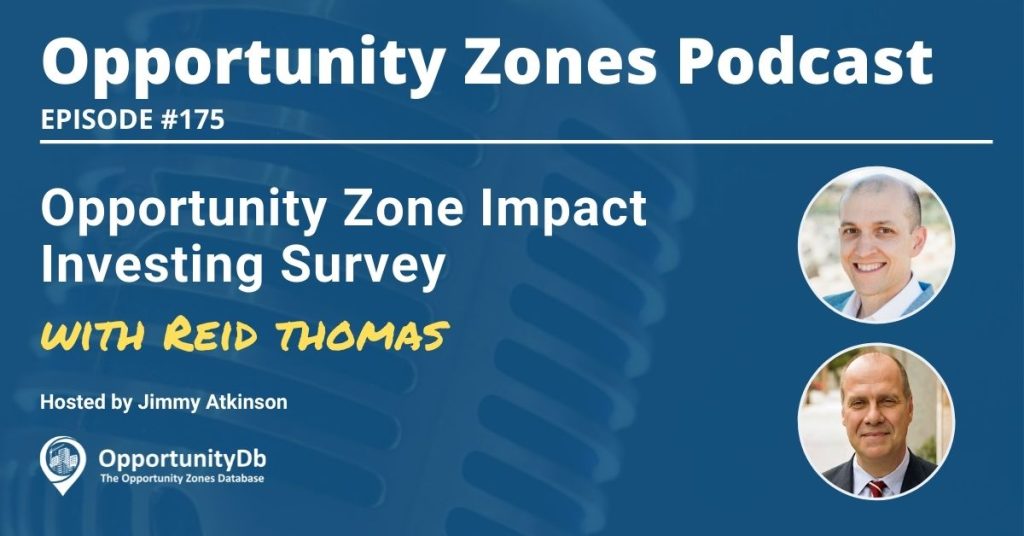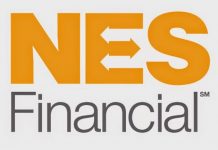Impact investing is an investment strategy that strives to generate social or environmental benefits in addition to financial gains. It also spans diverse range of assets, including bonds, public equity, and private equity, such as opportunity zones and New Market Tax Credits. But how does impact investing work, and how might one select a specific fund to invest in?
Reid Thomas is Chief Revenue Officer and Managing Director of JTC Americas, the North American division of JTC Group, where he is responsible for overseeing the day-to-day operations of the Specialty Financial Administration business unit.
Click the play button above to listen to our conversation with Reid.
Episode Highlights
- Information about JTC America’s survey on the impact investing elements of opportunity zones.
- Investment types that are highly specialized and with a focus social and economic good.
- How to identify investment activities that can create an impact based the social and/or environmental issues they want to address.

Featured On This Episode
Industry Spotlight: JTC Americas
JTC Americas, formerly NES Financial, is the North American division of JTC Group. JTC is a publicly listed, global professional services business with deep expertise in fund, corporate and private client services.
Learn More About JTC Americas
- JTC Americas
- JTC Americas on LinkedIn
About The Opportunity Zones Podcast
Hosted by OpportunityDb.com founder Jimmy Atkinson, The Opportunity Zones Podcast features guest interviews from fund managers, advisors, policymakers, tax professionals, and other foremost experts in opportunity zones.
Show Transcript
Jimmy: Welcome to The Opportunity Zones Podcast. I’m your host, Jimmy Atkinson. And today we’re discussing impact investing and an upcoming impact investing survey. Joining me today to discuss this is Reid Thomas, Executive Vice President of Sales and Marketing at JTC Americas. They are the organizer of the survey that we’ll be discussing today, and they’ve partnered with me and my team at OpportunityDb to bring this survey to the industry. Reid, thanks for joining us today. I believe you’re joining us from San Jose if I’m not mistaken. Is that right?
Reid: That’s right, Jimmy. And it’s always a pleasure to be here. Thanks for having me on again.
Jimmy: Yes. A pleasure to have you on the podcast. You’re one of my most prolific podcast guests. You’ve been on a few episodes with me. I’ll be sure to link to all of your prior appearances on The Opportunity Zones Podcast in the show notes for today’s episode. So let’s talk about the impact investing survey that JTC Americas is organizing. First, what is it exactly, and why are you doing it?
Reid: Yeah, what we’re really doing is putting together…we’re doing a survey in order to put together a market research report that really focuses on the impact investing elements of the opportunity zones. And it’ll extend beyond that but opportunity zones is obviously the homebase for this. And the reason we decided to do this is because it’s no secret that the future of the opportunity zones program depends really on the perceived success that the initiative is gonna have in terms of delivering the economic results to communities in need. I mean, Congress has been all over that. That’s the rhetoric we hear consistently. There’s quite a few versions of legislation that have been introduced to propose measurement of impact and impact reporting. All of the different industry groups and various stakeholders are behind that initiative as well. So, what we really wanted to do was use this survey to develop research to really help the industry understand what’s going on in terms of investor motivations, as well as sponsor desires.
Jimmy: And I’m curious now, who are you expecting to take the survey? Are you surveying the different product sponsors, fund managers, whatever you wanna call them, or are you surveying investors or a little bit of both? Who would you like to have take the survey?
Reid: All of the above. One of the things we’ve observed is that we’re seeing fund managers, in particular, starting to shift to promote the impact elements of their funds more aggressively. And that’s what got us started on this. That’s a trend that we’ve seen across our client base now of over 200 opportunity zone funds. And so we were curious when we saw that as to what was behind that. And so we interviewed several of our clients to put the structure of the research report together, the survey together. So, part of the questions were oriented at additional sponsors to really learn what their views are on the importance and relevance of impact, how that plays into their fund formation strategies and investor recruiting strategies. On the other hand, investors were very interested to learn what investors are looking for and how this all connects. So this is one of the real important reasons why we’ve partnered with your firm, Jimmy, because you guys do such an excellent job of communicating with the community that’s out there. By partnering with you, we can get a really good perspective, not only of what fund managers are trying to do but what investors are trying to do. And hopefully, by connecting those dots, we can help fund managers design and develop products that are better suited for investors and we can help investors find the types of investments that they’re looking for.
Jimmy: Yeah, I think in some ways, we’re trying to get to the bottom of, I don’t mean to put words in your mouth, Reid, so push back against this, if I misspeak here, but I think we’re trying to get to the bottom of, is impact investing important to the investing community? And if so, why? And so then how can investment product sponsors or fund managers better market their products to drive home that point? Is that right? Is that kind of what we’re getting after here?
Reid: Not only is that spot on, but in addition to that, we’re looking for more detail than even that. So as an example, how do investors prioritize the impact elements of their investment? What kinds of trade-offs might they be willing to make, if any, in terms of an investment yield for certain elements of impact? What kind of reporting are they looking for along the way that the sponsor could provide? Those are the kinds of things that we think will be really, really helpful. But at a high level, you’re absolutely right, that’s the goal.
Jimmy: What other types of questions are you asking on the survey?
Advertisement
Reid: Yeah, those are types of questions, those are good examples of questions as to what we are definitely doing. We’re also asking lots of questions for fund managers in terms of their current fund structures, the types of things that they’re investing in, how they’re measuring and tracking the impact of the investments they’re making, those types of things. So it’s really a comprehensive survey. I think, in total, it’s about 25 or 30 questions. And we’re sending it out to enough people and we’re hoping to get lots of responses so that it’ll be certainly statistically valid, and something we can slice and dice in various ways together to provide the industry with some really meaningful information.
Jimmy: Yeah, the survey is open now, and we’re helping you promote it because we’re invested in learning the answers to a lot of these questions. And we’d like to hear from as many investors and fund sponsors as we possibly can. So, if you are interested in learning more about the survey, you can head over to opportunitydb.com/survey to learn more and to participate. Reid, I wanted to ask you about JTC Americas. I know you’ve been on the podcast several times before. You and I know each other quite well. We’ve known each other for a few years but for those who may be unfamiliar with JTC Americas, can you tell us a little bit more about your firm, its history, and what you guys do exactly?
Reid: Sure. So JTC is a global company. Actually, we’re a $1.5 billion market cap company traded on the London Stock Exchange. We have offices in 23 countries around the world. About half the business is a private wealth, private client business, and the other half is administrative services, like fund administration. So JTC Americas, we’re really focused on providing fund administration services to investment types that are highly specialized and really have a focus on ultimately doing good. You know, there’s been so many financial initiatives and incentives created over the years with good intentions, but far too often they fail to ultimately achieve the goal that they’re intending to. And one of the reasons for that is because the administrative burden can just be so huge by trying to provide all the data everybody wants, trying to meet all the regulations or compliance standards. These burdens can be just too much to allow the initiative to ultimately succeed. And in some cases, when there’s not enough of that stuff, then the system or the initiative gets abused, and it fails in that way. So, our approach was to really develop our own technology, which we use to do the administrative services to both protect against abuses and fraud, protect investors, protect fund managers, and at the same time, make it easy for them to comply with all the regulations and standards that are out there, including just basic financial reporting, financial statements and the like. You mentioned, we work together a lot, really in the opportunity zone space, because that’s an area that obviously, is a financial investment vehicle that has a lot of complexities, but it’s intended to do good and we wanna help see that through.
Jimmy: Yeah, your firm was perfectly positioned to capture a lot of those funds that needed that type of professional services, that fund administration platform that you have. When we’re talking about impact investing, especially with this impact investing survey that we’ve been discussing since the top of the show, what type of impact reporting does your fund administration platform offer for private equity funds or opportunity zone funds specifically?
Reid: It’s interesting because when we were building our product, we looked for solutions that we could implement that aligned with sort of the types of work that we would have to do anyway to provide the financial accounting, financial reporting services. So what we developed, we developed on our own. We also partnered with Howard W. Buffett, who’s famously the grandson of Warren Buffett, who has developed a way to report financial impact called Impact Rate of Return, that we could create an algorithm to work with. And so, by doing the fund accounting that we’re doing anyway, we can provide sort of standard information, like, what is the Impact Rate of Return, sort of to Howard’s formula, ut we also can calculate jobs created, labor income generated, taxable revenue generated for the community. We can track those kinds of things as just standard practice. In addition, we created the ability to have it be customizable because everybody has their own sort of passion for something, right? So, if the investment strategy is really oriented at improving education, there’s a way we can configure the solution to report on various education-related metrics. So we’ve been involved with a number of very, very interesting projects with all kinds of interesting goals, and we’re excited about using that system to help them achieve it. And then the reporting is something that’s online, available in real-time that the funds can use and to help them market their successes. Investors can track progress and something that’s available to all of our clients today.
Jimmy: No, that’s great. It’s great work that you do. And I know you represent a lot of qualified opportunity funds that are open and receiving capital and closed funds as well. You represent a lot of the industry is what I’m trying to say. I wanna get back to the survey for a moment. Actually, let’s zoom out and take a look at impact investing as a whole before we do that. And maybe I’m about to ask you a question that you’ll say, “Well, I don’t know. I gotta wait until the survey results come in,” but I’m curious if you do have any idea. I guess a two-part question for you, Reid. One, do you feel that there has been a trend toward impact investing from investors over the last several years or over the last generation or so? And two, why do you think that is if that is the case?
Reid: Certainly the data supports that that’s a trend. Impact investing is, I suppose, one class of the broader ESG investing definition. ESG, as a category, has exploded in the last years, it is extremely high profile, and the data would suggest that ESG funds actually perform…funds with an ESG focus or investments in firms with an ESG focus have a more positive…ultimately a more positive return. And so the market has been growing like crazy. This is particularly true, we find internationally, the European markets are further ahead, I would say than the U.S. is, in terms of its investing emphasis in this area and in terms of the reporting requirements. There’s much more governance and compliance sort of reporting standards in Europe. But the U.S. isn’t that far behind. And I think part of it is driven by just the shift in our demographic. It seems that this is…climate change, as an example, social impact, helping other communities, these are the things that have come to bear, I think, both from a generational perspective, as younger people mature, this has been something that’s front of mind for them. And now that they’re of age in many cases where they can make investments, they wanna help. Also, the pandemic that we’ve gone through for the last couple of years has certainly heightened awareness of folks who are challenged in some of these communities and could really use some help. So it’s becoming a big deal. It’s continuing to gain momentum. And I don’t think there’s gonna be any slowing it down. And in fact, I think just like we’re talking about in OZs about having some level of reporting related to the impact benefits of the investments, I think we’re also gonna see even at an SEC level, more diligence and more focus on making sure that ESG metrics and ESG reporting actually stand up to what they’re saying.
Jimmy: Yeah, particularly, if that was the intent of Congress when passing some of these laws that created some of these tax-advantaged investment vehicles, opportunity zones, being the elephant in the room here, of course, that we’re discussing right now, I think it’s important that at some point, we as an industry are able to prove that, hey, yeah, this is actually creating some impact. And in some of these places, it is doing the work that Congress intended to do. Absolutely, Reid, I couldn’t agree more.
Reid: Yeah, I think in terms of, you know, why this is happening, that’s one of the…bringing it back to the survey, going that next level down to try to look at the specific motivations of investors and what determines which impact investments they might pull the trigger on versus others is really where we’re trying to go with this survey, ultimately, right, to get it to a much granular level to help fund managers actually decide how to implement and structure funds in a way that can be most successful for everybody.
Jimmy: Right on. And the survey is open right now and it’s gonna close fairly soon, I believe. But once all the numbers are crunched and you’re able to put together a report, is that report going to be made public to anybody who wants to get access to it?
Reid: Yeah, that’s our plan. Definitely, those that respond to the survey, of course, all the responses will be anonymous and private, but on an aggregate, we’ll make the data available to those that participate. And we’ll also, through your help on your website and other marketing events, let folks know how to get that information.
Jimmy: Very good. Reid, well, like I said, the survey is open right now. And we are working with JTC Americas to help promote it and drive some response to it. So if you are an opportunity zone fund sponsor, or issuer, or if you’re an impact investor, or OZ investor, however you identify yourself, we would love it if you could help us out and take the survey. You can learn more by heading to opportunitydb.com/survey and there you can learn all about how to take the survey and how long it will be open for. And actually, if you’re listening to this podcast, maybe a few weeks after it’s aired, the survey may already be closed, but then you can opt in there to learn more about how to access the conclusions from the survey. So, either way, head to opportunitydb.com/survey to learn more. Reid, it’s been a pleasure speaking with you today. Appreciate your time.
Reid: Always a pleasure, Jimmy. Thanks so much for having me on. And thank you to your listeners for listening.









































